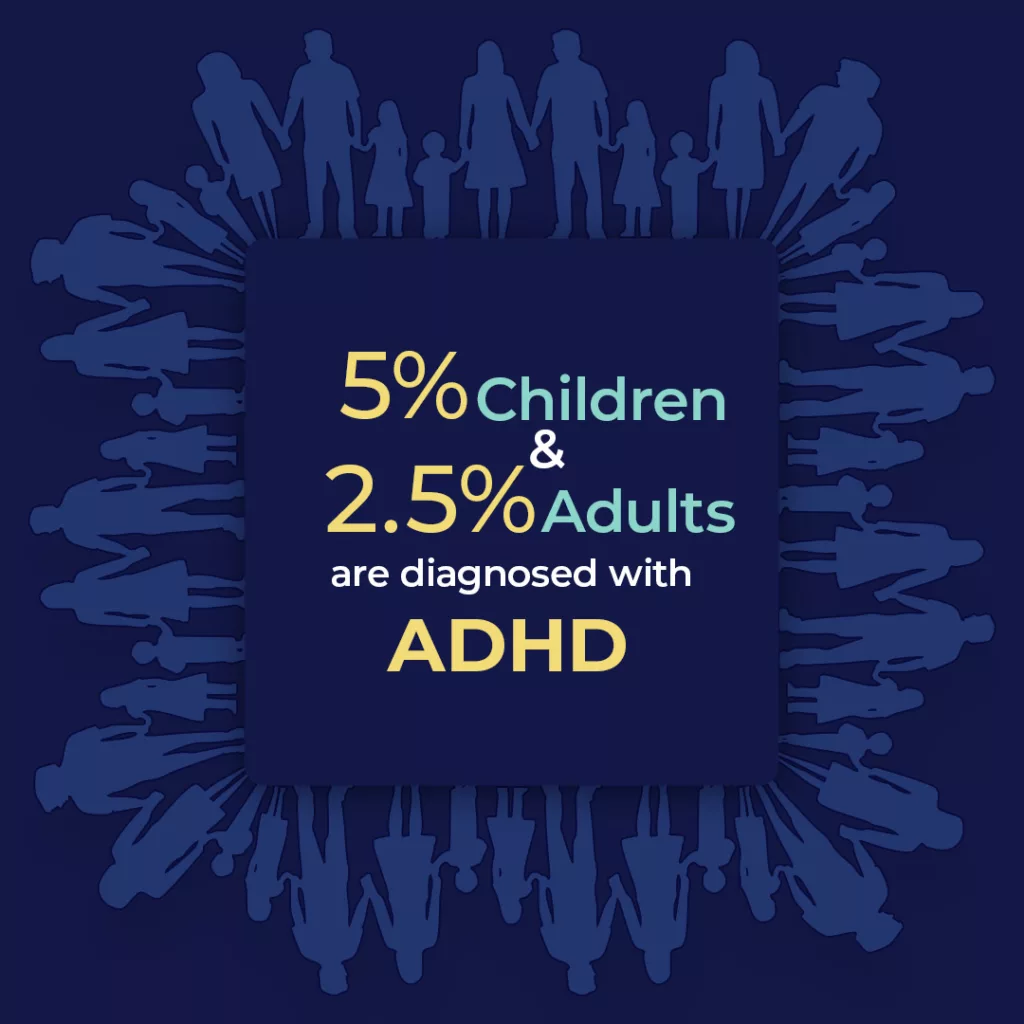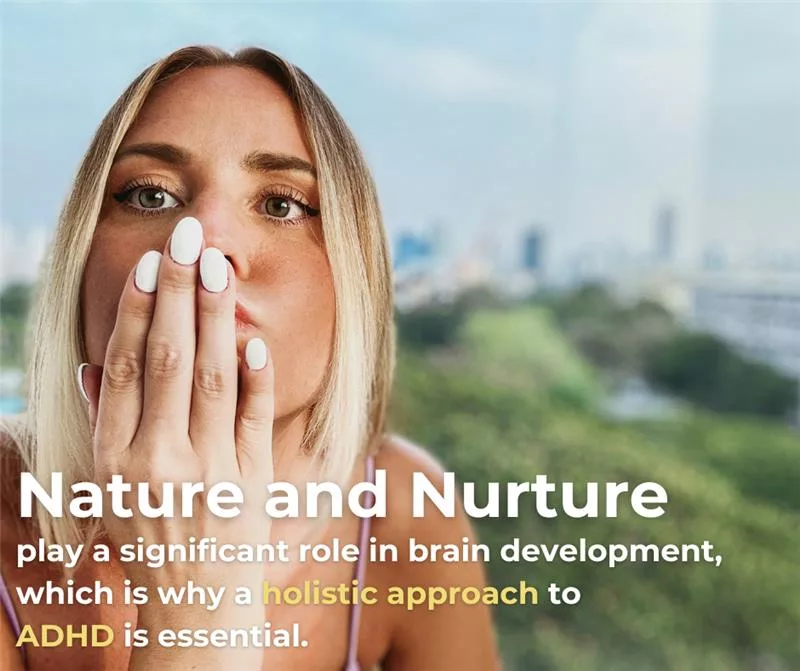The Science Behind ADHD: Brain Mechanisms and Research
Imagine struggling to keep your mind focused on a single task, feeling restless or impulsive without knowing why—this is the daily reality for millions of people living with Attention Deficit Hyperactivity Disorder (ADHD). ADHD is a neurodevelopmental condition that affects both children and adults, impacting their ability to focus, stay organized, and regulate emotions. It’s… Read more

Reviewed by The PsychPlus Team
December 9, 2024

Imagine struggling to keep your mind focused on a single task, feeling restless or impulsive without knowing why—this is the daily reality for millions of people living with Attention Deficit Hyperactivity Disorder (ADHD). ADHD is a neurodevelopmental condition that affects both children and adults, impacting their ability to focus, stay organized, and regulate emotions.
It’s not just about being “overwhelmed” or “easily distracted”; the challenges run deeper, often interfering with school, work, relationships, and overall quality of life. According to recent studies, approximately 5% of children and 2.5% of adults globally are diagnosed with ADHD, making it a common yet misunderstood condition.
Understanding the science behind ADHD is crucial, not just for those diagnosed but also for their families and communities. With deeper insights into how the brain functions in ADHD, we can break stigmas, improve treatments, and provide better support. Ready to learn more? Explore how PsychPlus can help individuals manage ADHD effectively by visiting our homepage.

Understanding ADHD: Key Symptoms and Characteristics
ADHD manifests through three primary symptoms: inattention, hyperactivity, and impulsivity. While everyone experiences occasional lapses in focus or energy, these symptoms are persistent and disruptive for those with ADHD.
- Inattention: This goes beyond being forgetful. People with ADHD may find it extremely hard to sustain focus, follow instructions, or complete tasks—especially those that require prolonged mental effort. Misplacing everyday items or appearing “lost in thought” is common.
- Hyperactivity: This isn’t just about being physically energetic; it’s an inner restlessness that can make sitting still feel unbearable. Children might fidget excessively, while adults may channel this energy into constant multitasking or an inability to relax.
- Impulsivity: Acting without thinking is another hallmark symptom. This could look like interrupting conversations, blurting out answers, or making hasty decisions that lead to regrettable outcomes.
These symptoms often look different in children and adults. In kids, hyperactivity may appear as constant running or climbing, while adults might struggle with chronic disorganization or taking on too many commitments at once.
To make matters more complex, ADHD frequently overlaps with other conditions such as anxiety and depression. This comorbidity can amplify challenges, making diagnosis and treatment even more essential. By recognizing these signs, we can take a compassionate approach to supporting those affected.
The Brain and ADHD: Key Mechanisms
Understanding ADHD requires a closer look at how the brain functions. Advances in neuroscience have revealed fascinating insights into the biological mechanisms behind this condition.
1. Neurotransmitter Imbalances
At the heart of ADHD is a disruption in the brain’s chemical messengers—specifically dopamine and norepinephrine. These neurotransmitters play a crucial role in regulating attention, motivation, and behavior. For individuals with ADHD, these pathways are often out of sync. Imagine trying to tune in to your favorite radio station but constantly losing the signal—that’s how ADHD affects the brain’s ability to stay focused and organized. This imbalance can lead to difficulties in completing tasks, managing time, and maintaining attention.
2. Brain Structure Differences
Research shows that certain areas of the brain are structurally different in individuals with ADHD. The prefrontal cortex, responsible for decision-making and impulse control, often shows reduced activity. Similarly, the basal ganglia and cerebellum, which help regulate motor activity and attention, may also have differences in size or function. These structural variations help explain why ADHD can impact both behavior and executive functions like planning and organization.
3. Connectivity and Communication Issues
The brain functions as a network, with different areas working together to process information and make decisions. In ADHD, communication between these networks—such as the default mode network (linked to daydreaming) and the executive function network (responsible for focus and task management)—is often disrupted. This miscommunication can result in a tug-of-war between staying focused and getting distracted. To learn more about managing these mental challenges, explore our related blog on Stress and Mental Health.
By uncovering these mechanisms, researchers and clinicians are better equipped to develop targeted treatments that address the unique challenges posed by ADHD.
Genetic and Environmental Influences
ADHD doesn’t arise out of nowhere. Genetics play a significant role, with studies showing that the condition often runs in families. If a parent has ADHD, there’s a higher likelihood that their child may inherit the condition. However, genes aren’t the only factor. Environmental influences also play a crucial role in shaping how ADHD develops and manifests.
Prenatal exposure to substances like alcohol, nicotine, or certain medications can increase the risk of ADHD in children. Early childhood experiences, such as exposure to toxins like lead or experiencing high levels of stress, can further influence brain development. These findings emphasize the need for a holistic approach to understanding ADHD, where both genetic predisposition and environmental factors are considered.

Latest Research and Emerging Insights
Advancements in research are constantly enhancing our understanding of ADHD. Imaging technologies, such as functional MRI (fMRI), have provided groundbreaking insights into how ADHD affects brain activity. These tools allow scientists to observe differences in brain regions and networks in real-time, opening the door for more precise diagnostic methods.
Additionally, recent studies highlight the significant impact of lifestyle factors like sleep and stress on ADHD symptoms. Poor sleep, for example, can exacerbate difficulties with attention and emotional regulation. Stress, too, can amplify impulsivity and restlessness. Addressing these factors is becoming a critical component of ADHD management strategies. For more insights into the role of sleep in mental health, check out our blog on The Connection Between Sleep and Mental Health.
These ongoing discoveries are not just academic; they’re shaping the way we support individuals with ADHD in real, tangible ways. With every study, we’re moving closer to treatments that are as nuanced and multifaceted as the condition itself.
Managing ADHD: Beyond the Science
While understanding the science of ADHD is crucial, managing the condition often requires a well-rounded approach. Treatment plans are most effective when they combine medication, therapy, and lifestyle adjustments tailored to each individual.
- Medication: Stimulants and non-stimulants are commonly prescribed to help regulate brain activity, improving focus and reducing hyperactivity. While medication isn’t a cure, it can significantly enhance daily functioning.
- Therapy: Behavioral therapies, such as Cognitive Behavioral Therapy (CBT), equip individuals with practical strategies to manage symptoms. Therapy can also address coexisting conditions like anxiety or depression, offering a holistic approach to mental health.
- Lifestyle Adjustments: Simple changes, like establishing routines, incorporating regular physical activity, and improving sleep hygiene, can make a world of difference. These adjustments empower individuals to regain a sense of control over their daily lives.
Early diagnosis is a game-changer. Identifying ADHD early allows for interventions that can minimize its impact and help individuals build skills to thrive. At PsychPlus, we’re here to provide compassionate support and tailored treatment plans. Take the first step and book an appointment with our dedicated team today.
Conclusion
ADHD is a complex condition that requires both understanding and action. By exploring the science behind ADHD, we can better appreciate the challenges faced by those living with it and the strides being made in treatment and research.
If you or someone you love is experiencing symptoms of ADHD, seeking help is the first step toward a brighter future. PsychPlus is here to guide you with personalized care and evidence-based solutions. Visit our Referral Page to learn more or explore additional resources on our Blog Page. Together, we can navigate the path to better mental health and well-being.
Find a mental health care provider near you
Learn about the conditions we treat


